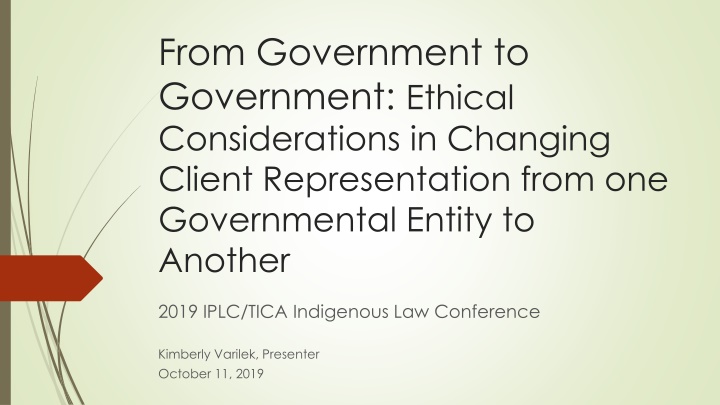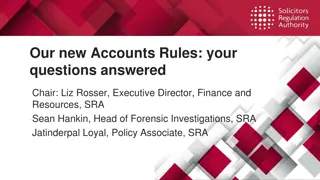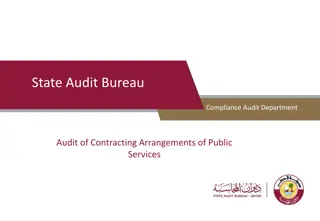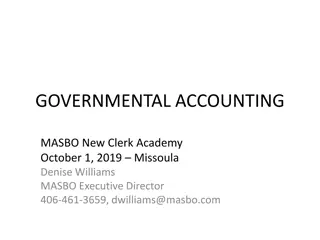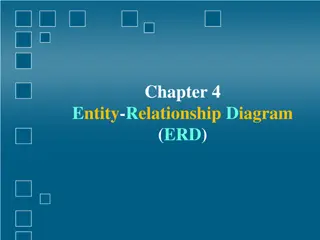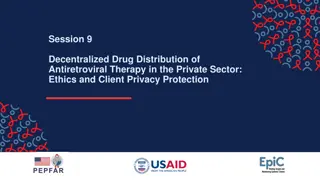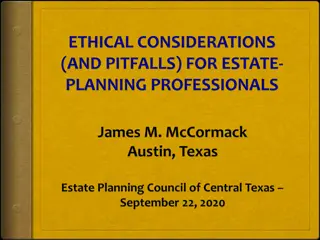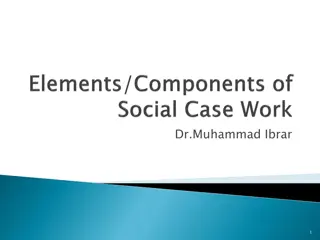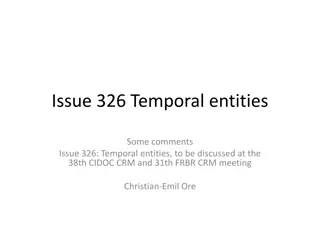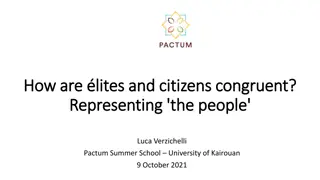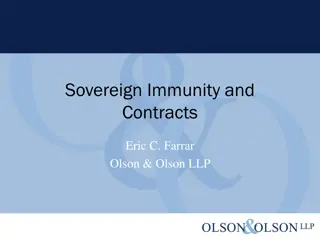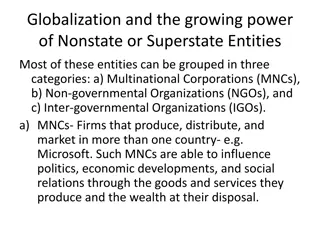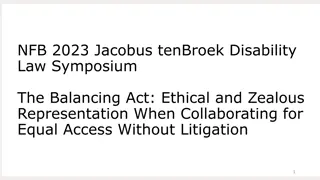Ethical Considerations in Changing Client Representation between Governmental Entities
This presentation focuses on ethical considerations when transitioning client representation from one governmental entity to another, emphasizing the importance of informed consent, confidentiality, and avoiding conflicts of interest. Rule 1.9(c) plays a key role in regulating the use of former client information to prevent disadvantage and maintain professional ethics in legal practice.
Download Presentation

Please find below an Image/Link to download the presentation.
The content on the website is provided AS IS for your information and personal use only. It may not be sold, licensed, or shared on other websites without obtaining consent from the author.If you encounter any issues during the download, it is possible that the publisher has removed the file from their server.
You are allowed to download the files provided on this website for personal or commercial use, subject to the condition that they are used lawfully. All files are the property of their respective owners.
The content on the website is provided AS IS for your information and personal use only. It may not be sold, licensed, or shared on other websites without obtaining consent from the author.
E N D
Presentation Transcript
From Government to Government: Ethical Considerations in Changing Client Representation from one Governmental Entity to Another 2019 IPLC/TICA Indigenous Law Conference Kimberly Varilek, Presenter October 11, 2019
General Rules Governing Entity Representation Rule 1.13 Organization as Client : (a) A lawyer employed or retained by an organization represents the organization acting through its duly authorized constituents.
Rule 1.9 (a)-(c): Continuing Obligations to Former Clients re: Confidentiality and Conflicts of Interest (a) limits future representation of another client in a manner materially adverse to former client interests unless the former client gives written, informed consent. If you previously represented a Tribal entity in a matter, you shall not represent another Tribe in the same matter, or a substantially similar matter where the new Tribal client s interests are materially adverse to the previous Tribal client s interests unless the previous Tribal client gives informed consent in writing (b) limits future representation when an attorney knowingly represents that new client in a matter when a previous client s interests are materially adverse to the new client, and about whom the attorney acquired information protected under Rule 1.6 (confidentiality) and Rule 1.9(c) that is material to the matter, unless the former client gives written, informed consent. You shall not knowingly represent a new Tribal client in the same or substantially similar matter when a previous Tribal client s interests are materially adverse to the new Tribal client AND when the Lawyer acquired confidential or information relevant to the representation, unless there s prior Tribal client s written consent.
And, Rule 1.9(c) restricts using a former client s information to that client s disadvantage (unless the information is generally known); and, restricts an attorney from revealing information relating to that previous representation. Lawyer shall maintain client confidentiality, and shall not breach that confidentiality in representing the attorney s new tribal client. Personal Story Related to Rule 1.9(c) Recusal memo with permanent and time-limited recusals Time-limited recusals expired (Matter Type) Updating recusal memo, identified my work may appear to impact similar work from my former client (specifically grants work) KEY POINT: current work is not as an Agency Legal Representative, BUT STILL REQUIRED TO PERFORM ETHICS REVIEW ANALYSIS
My Rule 1.9(c) Analysis: Lessons to Share Collaborate with agency Ethics Official and State Bar ethics official(s) - discuss scope of former recusal and changes Rule 1.9(c) Analysis : Practitioner Point determine whether you require written consent due to the nature of your activities; and, at minimum, provide notice to former clients. Identify Letter Content Points: Affirm continuing 1.6 obligations Clarify current role to avoid misunderstandings regarding your ethical obligations. If you are not required to obtain approval or waiver , be specific - what happens if the former tribal client opts not to give that recusal? AWKWARD Draft recusal review letter in accordance with your analysis. Provide copies of letter to previous client(s)
When Changing Governmental Clients - BEST PRACTICES If your new client has an Ethics Official or Prescriptive Code, Rule or Policy use the process. work with them to review your either permanent or time-limited recusal options. Provide copies and update Recusal Memos accordingly If no Ethics Official or Process complete the review yourself! Prepare a Recusal Memo collaborate with your state bar ethics representative(s). Distribute the Recusal Memo to your decision makers, relevant tribal departments and/or Supervisor or Staff.
Other ethical requirements to consider when changing clients: Tribal laws or policies? Example: Standing Rock Sioux Tribe codified their Tribal Employee Code of Ethics (Title XXVII); defines key terms like Confidential Information and Conflicts of Interest ; and, requires Financial Disclosures and possible Conflicts of Interest statements. State Laws or Policies? Example: Colorado s Constitution (Article XXIX), states statutes and other rules govern the government employees & officials and have Ethics Commission to provide guidance through Advisory Opinions, Letter Rulings or Position Statements to provide guidance for conduct that has yet to occur. Federal Statutes or Agency/Department Policies? Example: The Hatch Act 5 U.S.C. 7321-7326 identifies prohibited political activity for federal employees, including Political Appointees and both further-restricted or lesser- restricted employees, and may include restrictions for: fundraising for candidates or political parties; running for partisan election; use of agency affiliation or title in connection with a political activity; engaging in political activity at the workplace, coercing subordinates to engage in political activity; and, soliciting outside business who engage with the agency.
QUESTIONS ANSWERS Thank you!!
